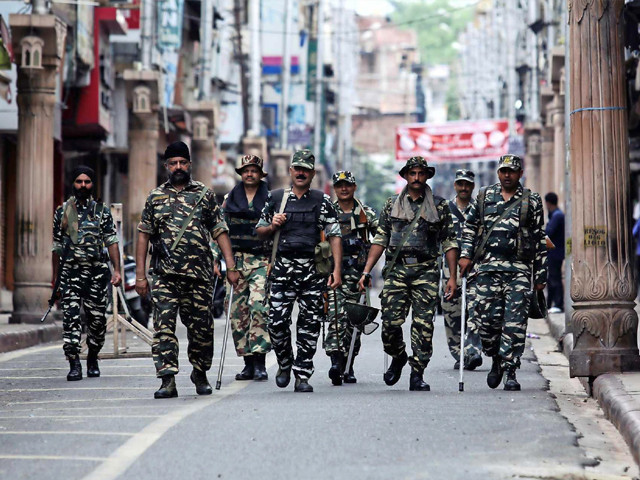Following the scrapping of Article 370 of the Indian constitution by the Indian government on Monday, there is a sense of déjà vu among the ruling party, a strong section of the majoritarian community and a section of the media. They are rejoicing that the 'Kashmir problem,' a legacy of history, has been ‘resolved’ once and for all by discarding the legislature since it was a hindrance in the final integration of Indian-occupied Kashmir (IoK).
The problem with this argument is that it disregards history, ignores the larger reality of geo-politics and completely discards the political aspirations of the people of Kashmir.
Can we say that by removing Article 370 we have solved the issues plaguing Kashmir? Can we say that Pakistan is now no longer party to any solution in Kashmir? Can we say that militancy and political unrest have been curbed in the valley?
New Delhi knows the answers to these questions and so does the international community.
No matter how many articles are added or deducted, no matter how many divisions IoK is subjected to, no matter how many troops are sent into the region, the cardinal truth remains that the Kashmir issue cannot be solved unless India engages in dialogue with Pakistan and the people of Kashmir.
The ruling Bhartiya Janata Party (BJP) and its patron Rashtriya Swayamsevak Sangh (RSS) might have succeeded in selling a myth that the problem in Kashmir is due to Article 370, but the hard bite of this reality cannot be hidden. India and Pakistan have fought two major wars over the issue of Kashmir, but the problem has remained stuck at the very juncture where it began in 1947.
It is also a fact that both India and Pakistan committed themselves to bilateralism, both in the Simla Agreement in 1972, and the Lahore Declaration that Nawaz Sharif and Atal Behari Vajpayee signed in 1999.
But bilateralism has become a victim of India’s intransigence and has failed to move beyond tokenism.
The engagement between the two nations has always been haphazard, temporary and inconsistent. After the 2008 Mumbai terror attacks, talks between India and Pakistan essentially collapsed. Attempts were made to revive discussions in between, and some progress was also made, but the talks remained stuck in limbo.
Since 2014, a new political culture has come to dominate the Delhi durbar. Talks between the two neighbours have become a prisoner to the whims of the rulers. Dialogue is not considered as an enhancement of the peace process but as an image makeover for the new ruler. The peace process is now supposed to cater to the ego of the supreme leader; it is not taken as an instrument to usher in a new era in the subcontinent.
The years Modi has had in power have been the most unproductive years with regards to improving ties between Pakistan and India. Never before has India been as defensive about peace between the two nations as it is now. A situation has emerged where there is every possibility that you might be threatened or condemned if you wish to talk about peace. It appears that those who want to write about dialogue and cooperation between the two nations have been banished from the editorial pages. Hawks occupy the prime position in television studios and a new generation of youngsters are being brainwashed and radicalised.
What peaceful solution could possibly emerge in IoK if both nations are too pre-occupied with their bickering.
Given the newly emerging situation in IoK and Pakistan’s reactions to it, one thing is clear: there will be no dialogue between the two nations and this will only lead to an increase in bitterness and enmity. The Indian leadership is evidently not interested in trying to usher in a new era of friendship with Pakistan since that would not suit Modi’s political persona and his politics.
What’s the option then?
The international community feels concerned that the continuous tension between the South Asian neighbours will only fuel radical insurgency, not only in the region but beyond as well. Donald Trump’s statement has to be seen in that context. It’s immaterial whether Modi asked him to mediate between India and Pakistan or not. What is significant is the geo-political concerns about the lingering turmoil in South Asia and radicalisation of Kashmiri society.
The latest development in Kashmir after the abrogation of Article 370 and the bifurcation of the state does not augur well for peace in the region. It appears that conflict will only rise in the valley, impacting the relationship between the two nations.
America could not control or contain a disparate terrorist group called the Taliban and despite spending billions of dollars, they were compelled to hold talks. They desperately want an end to the conflict and realised that this peace can only come through dialogue.
This serves as a lesson for India. Talks are the key. These discussions can be bilateral or multilateral, all that matters is the end result – peace.
India and Pakistan need to win peace, not arguments
What peaceful solution could possibly emerge in IoK if both nations are too pre-occupied with their bickering.

Occupied Kashmir remained virtually cut off from the outside world for a second day with phone and internet links cut and thousands of troops enforcing a curfew. PHOTO: AFP


COMMENTS
Comments are moderated and generally will be posted if they are on-topic and not abusive.
For more information, please see our Comments FAQ